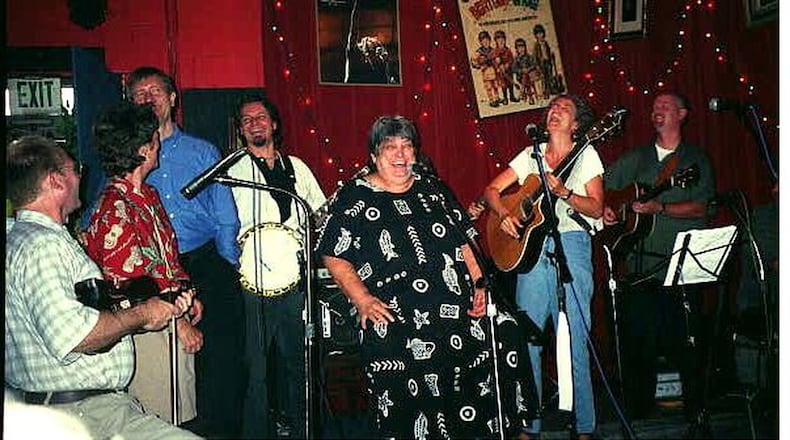Joyce Brookshire, a singer-songwriter whose music frequently expressed her love of the North Georgia mountains and Atlanta’s Cabbagetown, died June 4. She was 76.
A memorial service will be announced later by Haugabrooks Funeral Home in Atlanta.
Brookshire was born in the Appalachian mountains of northeast Georgia. Her family was one of many to make a move to Atlanta for work at the Fulton Bag and Cotton Mill.
She grew up in Cabbagetown. Her mother worked in the mill and raised four children alone in an $11-a-month rental after her husband went out for apples and never came back, said Elise Witt, a fellow singer-songwriter and friend for 38 years.
Brookshire began writing songs when she was nine, and what she lacked in technical musical knowledge she made up with heart and passion, Witt said.
Song was a part of Brookshire’s life as long as anyone can remember.
Leon Little, who ran Little’s Grocery in Cabbagetown, said Joyce and his younger sister Faye could often be heard singing as they played on a swing set near the Little home.
“She was always around our house,” said Little, who was in class with Brookshire from kindergarten through high school. “She was like another sister to me.”
In the early 1970s, Brookshire went to work at The Patch, a drop-in center for kids in crisis in Cabbagetown. At The Patch, she met folk singer and political activist Esther LeFever. Brookshire credited LeFever, who died of cancer in 1999, with nurturing her talents as a songwriter and performer. “Without Esther, most of my music might still be in my head, “she said in her promotional material.
In the 1970s and 1980s, Brookshire toured with folk singer Guy Carawan, lived in Knoxville, and had a band, Phantoms of the Opry, with Phyllis Boyens, who played Loretta Lynn’s mother in the movie “Coal Miner’s Daughter.”
Her first solo album, North Georgia Mountains, was released in 1977 by Foxfire Records. Other albums followed, including, “Whatever Became of Me” in 2000 and “Cabbagetown Ballad” in 2005.
She was featured, along with the Indigo Girls and other well-known Atlanta musicians, on the album “Don’t Eat Out of Dented Cans,” produced by WRFG Radio. Her music also was featured in the theatrical productions, “Cabbagetown: Three Women,” “Ponce de Leon,” “Blood on Blood,” and “Texas Two-Stepping with the Girls.”
Witt met Brookshire at a performance of “Cabbagetown: Three Women,” and the two “instantly became friends.”
They sang together for 38 years, Witt said.
Brookshire’s songs are heavily influenced by the rhythm and blues and rock’n’roll that was popular in her teenage years.
She wrote everything from stirring love songs to sharp satire. One song she penned posed the question: “What will we do with the homeless when the Olympics come to town?”
Witt said Brookshire’s music was “at least as good as anything that has made it to the Top 40. She never got the credit she was due,” she said. “But she didn’t let that bother her.”
The Georgia General Assembly honored Brookshire for her service to the Cabbagetown community and state in 2009.
John McCutcheon, an American folk music singer-songwriter who has produced more than 30 albums since the 1970s, met Brookshire when Firefox at Rabun Gap was in its heyday and George Reynolds, Foxfire’s music director, was starting a record label.
Brookshire was to cut one of Foxfire’s first albums, McCutcheon said.
“Joyce was incredibly magnetic, and she was larger than life in every way,” he said.”She exuded a kind of charisma you couldn’t resist. And she had the most wonderful laugh.”
Peggy Brookshire Wall described her sister-in-law Joyce as a “very sweet person, always with a smile on her face.”
She said that throughout her life, Brookshire wrote many songs and poems, many about or for her mother.
McCutcheon said Brookshire never saw herself as a performer.
“She knew you could say in song what you can’t say in words,” he said. “She is an incredible loss to the Atlanta community and all who knew and loved her.”
A memorial celebration of Brookshire’s life and music, featuring a lineup of folk, bluegrass, blues and rock musicians, will be held later this summer, Witt said.
About the Author
The Latest
Featured


